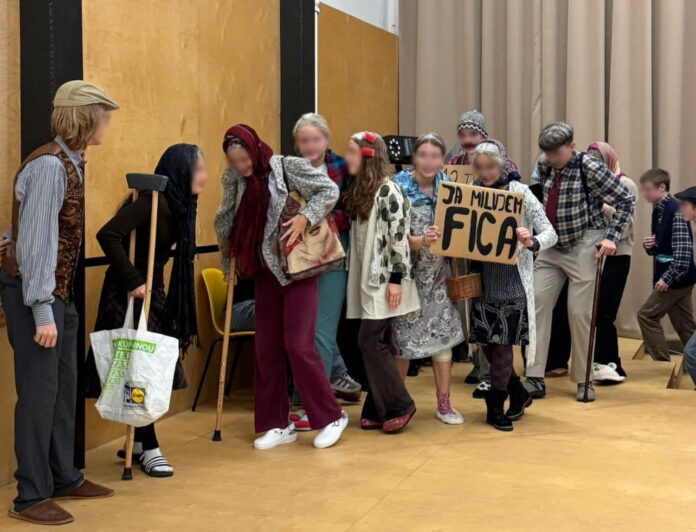A Halloween costume worn by students at a Bratislava high school ignited a public backlash and threats against the school’s principal. A statement by Interior Minister Matúš Šutaj Eštok further politicised the incident, sparking widespread debate about generational respect and free expression in Slovak schools.
Background of the Controversy
Students from Gymnázium Bilíkova in Bratislava celebrated Halloween with a school-wide carnival, where some chose costumes inspired by Slovak cultural figures, film characters, and Bratislava landmarks. One group of students dressed as elderly people, a costume they intended as a humorous take on senior life. However, controversy arose when a student in the group carried a sign reading “I love Fico,” referencing a viral video associated with a supporter of the Smer political party. This sign, interpreted by some as a political statement, triggered significant social media backlash.
While the students clarified that their costume did not aim to mock or criticise senior citizens, online commentators interpreted it as a disrespectful portrayal. Principal Daniel Kasala reported receiving numerous threatening messages and vulgar emails, prompting him to contact the police. “I never anticipated such an intense reaction,” Kasala stated, describing the situation as “absurd.”
Public Responses and Official Statements
Interior Minister Matúš Šutaj Eštok added fuel to the fire by associating the student’s costume with opposition protests and comparing it to propaganda used by authoritarian regimes. He suggested that the costume was an example of “political manipulation,” attributing the heightened societal tensions to progressive politicians.
Reacting to the criticism, Gymnázium Bilíkova’s administration issued an apology, stating that the costume was misunderstood and intended only for light-hearted enjoyment. The apology failed to satisfy Michal Kotian, head of the Slovak Pensioners’ Association, who filed a complaint with the school inspectorate. Kotian maintained that the costume was offensive and insisted on an investigation.
In a subsequent statement, representatives from the student council reiterated that no disrespect was intended and extended an invitation for Kotian to discuss the matter with the students directly. Minister of Education Tomáš Drucker, a member of Eštok’s party, Hlas, welcomed the students’ apology and underscored the need for mutual respect across generations. Drucker, however, refrained from commenting on Eštok’s video, focusing instead on condemning the threats directed at the school.
The Role of Satire and Social Media
The incident gained further attention after a satirical social media page shared a photo of the students’ costume, framing it as a critique of the current government. This portrayal attracted support from government critics, who praised the students, while others criticised them for perceived disrespect toward seniors.
Student organiser Peter, a member of the school’s council, voiced frustration over the online response, expressing disappointment at the politicisation of the costume. “No one bothered to understand the full context,” Peter said, describing the costume as purely entertainment and free from political intent. “People, including some politicians, twisted its meaning to suit their narratives.”
Ongoing National Debate on Respect and Free Expression
The incident highlights the broader societal tension around generational respect and freedom of expression in Slovakia’s schools. Gymnázium Bilíkova, one of Bratislava’s larger schools with bilingual programmes, has faced mounting social media scrutiny, part of which principal Kasala attributes to the charged political climate. He underscored that the school community values all generations, pointing to student involvement in local community initiatives as evidence of their respect for the elderly.
The school’s response reflects an attempt to balance student expression with societal expectations, a tension further complicated by political figures using the incident as a platform for debate. This case has also garnered international interest, with Politico noting Eštok’s comments linking the costume to propaganda techniques, a reaction it deemed “highly sensitive” to student expression.
The incident underscores a delicate balance in Slovak schools between allowing youthful self-expression and respecting societal norms, with education officials and student representatives striving to navigate these challenges amid political pressures.
Source: Vladimír Šnídl | Denník N







